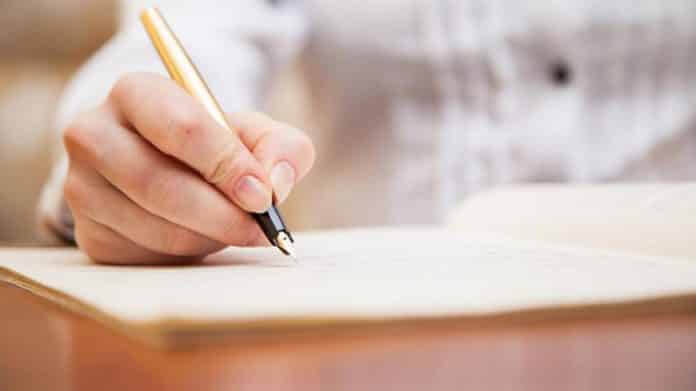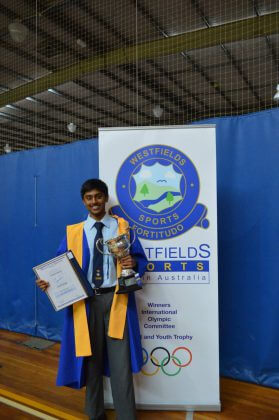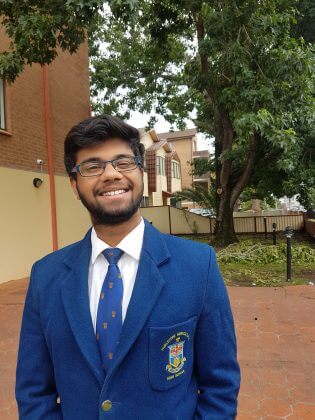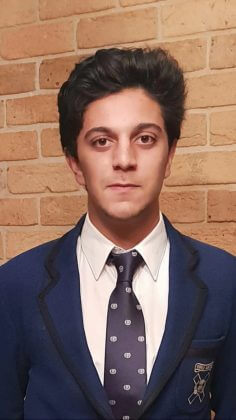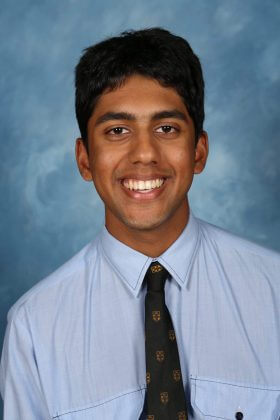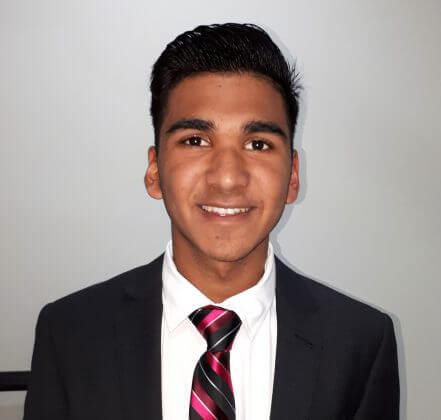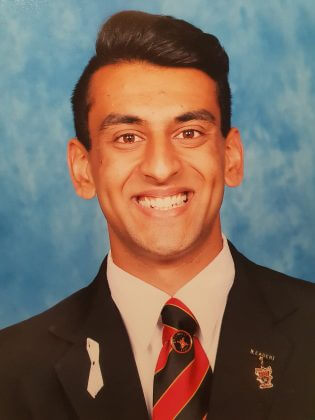Reading Time: 12 minutes
What goals did you set at the start of the year, if any? Did they change? Did you achieve them?
Venkatesh (Jishnu) Thangallu: My initial goals were into an engineering field, and to score well so more opportunities are available to me. As the year progressed the field of aeronautical and aerospace engineering allured to me. I believe I have achieved these goals rather well.
Keshav Manaktala: From the beginning of Year 12 my mind was mainly set on studying law at university so I set this as a goal to achieve.
Kiran Gupta: I didn’t really set a huge amount of goals. I prefer to do the best I can and take opportunities as I can. I certainly did not expect to top the state and achieve an ATAR of 99.65 though.
Rohan Bhatia: My goals for the year were to achieve the All-Rounder award, receive a 99.50 ATAR and to ensure the HSC would not impede on my social life. These goals remained consistent throughout the year and I remained determined to achieve them. I ended up receiving the All-Rounder award and actually achieving the exact ATAR I wanted – 99.50. I remained social and involved in the community with my part-time work, community service and participation in both soccer and tennis twice a week.
Rohan Agrawal: The main goal I had at the beginning of HSC was to get at least 95 for my ATAR, and mainly target a 90+ for the majority of my subjects. I didn’t achieve all of my goals, but I did get an ATAR of 96.05 that allowed me to do my desired degree of commerce and economics as my career goal is investment banking, so overall I was happy that I maintained balance in my social life and still achieved my ultimate goal.
Sourish Iyengar: Initially my goal was to achieve a 99 ATAR. Closer to the final HSC exams my target dropped to 98+. Despite not achieving this rank (instead a 97.25). I think it was imperative that I set such a high target early on. In doing so, I may not have achieved my goal, but still strived to perform to the best of my ability whilst also managing other non-academic commitments (e.g. hockey). Another goal of mine was to study Data Science at USYD or UNSW in 2019. I received offers from both universities and am planning go to USYD.
How did you manage stress throughout your final year of high school?
Jishnu: I managed it by keeping actively aware of my stress and to have faith in my abilities. Throughout my year I have learned to keep a balance between not being too lax (in which I went too slowly), and being too stressed (in which I was very susceptible to errors). The fine line between them is what I strived to be in the exam situations and achieved.
Keshav: Going to the gym to take my mind of studying and to stay fit which is important during Year 12.
Kiran: I did a lot of music. I did the school musical as well as doing my CMUS diploma and trying to perform as much as possible. Before I got sick, I also played tennis with my friends when I could and made sure that I ate healthily throughout the exam period.
Rohan B: To be honest I didn’t really feel stress at all until about 3 days before my first HSC English exam. To manage it, I would go to the park and kick around my soccer ball every couple of hours to just clear my headspace.
Rohan A: A lot of my stress relief came from watching television shows and listening to a lot of music, as it gave me a sense of comfort. It allowed me to be relieved from studying for a while and an opportunity to turn off before starting up again. I didn’t let it fully occupy my time as well, because studying is more important and time consuming for subjects that are very memory based. My brother, who himself state ranked in Maths Ext 2 in 2016, helped me a lot in mathematics Ext 1 and Ext 2 and guided me to keep my nerves calm all through-out the year.
Sourish: I created a timetable where I was rewarded 1 hour to do whatever I wanted for every 2 hours I studied during the exam period. Whenever an exam block was over I ensured I properly recuperated and relaxed with friends before zoning into my regular study habits again.
Do you think technology and social media are helpful for study, or are they distracting?
Jishnu: They could be both distracting and useful. I used my social media primarily as a medium to collaborate with other students, in which my doubts would be sent and discussed with my peers and their doubts to me. In this way we would benefit together. I have spent significant amounts of time socialising with friends and enjoying my time, but I must admit that it helps make an enjoyable and relaxing time to cool off a little. I had to be wary of not going on social media too often for unproductive things, but I think I handled that well.
Keshav: I think that social media was extremely beneficial over the course of Year 12 because it enabled me to be a part of several group conversations on Facebook for all my subjects and allowed me to message friends if I ever had a question to be answered.
Kiran: Certainly a double edged sword here but I found technology to be more useful. I think it is extremely beneficial to have notes digitized and easily locatable (especially considering how many times I lost them!) However, certainly there were times when I need to do a self-imposed phone hiatus because it was just too distracting. I actually deleted social media through the HSC block on my phone and kept it only on my computer which stopped me checking regularly which was quite useful.
Rohan B: It definitely can have both positive and negative consequences on studying however, as long as you have some self-control and will to study, technology and the internet as a whole is an excellent medium to locate information much more conveniently than books. Social media itself can be fostered to create a platform where students can ask and answer each others’ questions. I myself found online forums like ATAR Notes to be quite useful throughout the year.
Rohan A: It depends. I can’t really say much because I didn’t have social media, so I wasn’t distracted by that. In fact I got my first smart phone only after my HSC exam. Overall, technology can be distracting, especially because there are so many options to use it for – TV shows, YouTube, etc. I feel like I could have procrastinated less on videos and games on my computer, but it wasn’t completely detrimental to my studying pattern.
Sourish: Overall, I believe that technology and social media are helpful. Technology allows you convenient access to a wealth of information in an instant. This is imperative during the HSC where one will be constrained by time during the whole course of the year. I believe social media can be helpful depending on how it is used. For the most part I used social media as a forum to communicate to peers with reference to questions I struggled in, or areas where I needed to develop my understanding of certain concepts. This utilization of social media can be extremely beneficial and allow an individual to quickly fill up gaps in their knowledge.
In 2017, South Australia and the Northern Territory trialled an electronic version of their end-of-year English exam. Do you think this is a possibility for your state? What kind of impact do you think it could have on study patterns and the exam in general?
Jishnu: This surely is a possibility in our state, and I believe the implication is that it helps bring society as a whole to be more familiar and accustomed to the interface of technology.
Keshav: I do think that in the coming years more and more exams will be done electronically, although I personally would not be in favour of such a decision. After completing the HSC, I believe that writing fast by hand is a skill that can differentiate yourself from others and there are also several studies that support the beneficial use of writing by hand.
Kiran: It would be a logistical challenge but I would love it! As someone who had very messy handwriting, it was a nightmare for me to fix and I would have much preferred to just focus on actual skills in the course rather than handwriting as well. It would be very expensive though. I ended up handwriting everything from about September to improve my speed and legibility so I think computer usage in exam would mean more focus on learning content and greater ability to produce high quality content in the exam.
Rohan B: I could definitely see NSW shifting to an electronic HSC in the near future with most professional careers no longer requiring the skill of writing, and rather being more reliant on computer technology. I think this would actually have a negative impact on study patterns however as learning and understanding content from textbooks is more effective through the means of writing out notes and essays by hand.
Rohan A: It definitely could be a possibility for NSW, especially because English was designed to test our understanding of a text in reference to their respective contexts or to a particular concept or idea. Digitising the tests allows a shift of focus from time-based restrictions to a more relevant assessment of the understanding of a text to answer a question. However, it doesn’t entirely stop the memorisation pattern that has been happening for a long time, because people still need to remember the textual and visual evidence to answer the question. Digitising the tests, however, could end up spreading to other subjects as well, especially the sciences, and that can be very problematic because science is a very writing-based activity.
Sourish: I think it’s definitely possible. During HSC I replaced my books with my laptop to take notes, so it would’ve been an easy transition for me. Rather than writing my essays by hand while practicing, the implementation of an electronic exam would influence me to practice typing at a greater efficiency with reference to English.
Favourite quote from a teacher?
Jishnu: RTFQ: Read the full question
Kiran: “Try to think of this course as more than a mark, but a new way of living” – English Extension Teacher (we did a course focused on global studies and global ethics)
Rohan B: [Canteen lady increases prices by 20% for ‘inflation’], Economics teacher: 20%? 20%!, you go tell her inflation is at 2% and the nuggets are a goddamn rip-off!
Rohan A: Remain focused.
Sourish: “Practice doesn’t make perfect, practice makes better”. The quote resonates with me because it reinforces that every individual should strive to reach new heights no matter what level they are in the present.
What would your advice to future final year students be?
Jishnu: This is your last year at high school. Live it up and enjoy. Be happy with the results you have, but always strive to improve. An exam is like playing at a championship. You need to learn how to play (learn the content), then you go play, play and play some more (practise a lot, exposing yourself with a wide variety of questions, from exam papers, to textbooks, to your friends and teachers in class). Don’t over-rely on notes. Rather, use them as your training wheels and when you do have some momentum going, use them sparingly.
Keshav: Do subjects that you are interested in and don’t be influenced by family and friends and also things like scaling, because at the end of the day a high mark in a low scaling subject is better than an average mark in a high scaling subject.
Kiran: Pick subjects that you love. I did what many would consider to be “low scaling subjects” (music 1, French, Italian) but I really engaged with the courses and managed to get 99.65. Maintaining passions (for me, music) is also fundamental to succeeding in the HSC because otherwise, the year is too consuming.
Rohan B: My advice to final year students would be not to fall into the trap of completely shutting down your life in order to solely focus on the HSC. For sure, it should be the central focus,
however students often fall into the habit of halting any social activities they have and not hanging out with friends. The best way to get through this tough year, and it certainly is tough, is to manage your time effectively so that you have enough time to socialise and reflect upon your life, rather than being caught up in studies 24/7.
Rohan A: Study smart and not hard. There are easier ways to remember large chunks of information in short periods of time. A lot of the new syllabus content is very theory and calculation based, there is less practical application questions, so it is very important to focus on practicing exam like questions.
Sourish: The year will be tough and there will be times where you feel like quitting, but continue to strive and persevere so that you’ll be proud of what you have achieved at the end of the HSC. That being said, be careful not burn yourself out in the process and make sure you take time to relax as this year will be a hell of a rollercoaster.
What are you most looking forward to now that school is over?
Jishnu: Enjoying my time and relaxing and going out with friends, but also preparing myself for the years ahead, always passionate to learn more and discover what else I don’t know.
Keshav: Watching cricket for the next 2 months and enjoying the hot weather without the thought of needing to study.
Kiran: I have had a nice relax for the last few weeks and now I am looking forward to resuming singing and performing and working hard to take my music to the next level. I am also looking forward to pursuing more diverse tertiary study that transcends the sometimes monotonous routine of high school work.
Rohan B: I am most looking forward to beginning my path to my dream career of a lawyer, where for the next five years I’ll be able to study the subject that I thoroughly love and enjoy. I am very excited to do extensive reading and learn all about the legal and political systems of not just Australia and India, but of all countries.
Rohan A: I’m very much looking forward to university and the challenges and fun it is going to bring, especially being given more independence in a larger environment. It will take a lot of getting used to, but that’s the fun of it. I hope that it will give me a greater challenge than high school and I hope to make the most of the opportunity.
Sourish: With the HSC being so hectic, I’m just looking forward to a nice relaxing summer break. After that I’m keen to transition into university and progressing through another milestone in my life.
Do you plan to stay involved with your school in any way?
Jishnu: Yes I do wish to stay involved with my school, to help fellow students there, and to be proactive within the school community.
Keshav: I plan to present the Legal Studies seminar for Year 12 students this year in a program where Knox Boys from the previous graduating year come into the school to share tips and tricks about how to do well in the subject.
Kiran: At the moment I have no plans, although I may be involved in school music in some way.
Rohan /: It does depend on what types of opportunities come up in terms of school commitments. I might get involved in terms of mentorship programs and coaching, as it might help me further on my leadership skills and help future students build on their own skills.
How do you think university will compare to high school socially and academically?
Jishnu: I think the education system we grow up with is like a tree. High school and primary school makes up the ‘trunk’, which is straightforward and linear. In university it branches out into many specific ‘leaves’ that we specialize in. The idea of university being driven more by one’s genuine passion for a topic or field appeals to me greatly. In terms of social change, I think it is much more open ended, as it is much more up to the individual to make the effort to make friends, whereas high school is a much more closed group.
Keshav: I think the social aspect of university will be similar to starting Year 7 where everyone is open to making new friends from all different backgrounds, whilst also keeping in touch with their old school mates. On the academic side, I think that the early years will offer opportunities to mix and balance study with other hobbies and interests, with this slowly progressing to becoming more academic focused towards the middle and final years of the degree.
Kiran: It will certainly be different. I guess it will be more academically rigorous and more difficult to find time to socialize but it’s a new challenge and something I look forward to.
Rohan B: I expect university to be much more independent in the style of learning with professors and lecturers having a much less direct impact on the students. As I’m attending University
of Sydney, I expect the competitive culture there to be quite a step up from the more relaxed atmosphere in high school. Socially, I do expect to enjoy university more, with the ability to have 1-2 days off per week and to enjoy the social events held within the university itself.
Rohan A: Socially, university will be a lot better because it gives greater exposure to different cultures, making new and more friends, meeting people who do different things and have completely different personalities. Academically, it looks very different, more strenuous and very little time to adapt to a changing environment which provides flexibility but needs more self-discipline.
Sourish: Socially, I think you’ll have to make more effort to make new friends through social networking and other university events. In high school everyone was confined within close quarters of each other. Additionally, allocated periods for recess and lunch made it inevitable that you would interact and make friends. In university I believe it will up to the individual to take the initiative to interact with other students despite the high volumes of individuals enrolled in the uni. I feel that in university there will a lower level of academic guidance from professors as we become more responsible for our educational excellence. Despite this, I believe that those that embark in courses that they are truly passionate in will excel to a greater extent than in high school.
Describe your HSC year in three (or four) words.
Jishnu: Enjoy. Breathe. Focus.
Keshav: Hard work and repetitive but rewarding.
Kiran: Challenging, stressful, doable
Rohan B: Hard work paid off!
Rohan A: A roller-coaster ride.
Sourish: Stressful, challenging, rewarding and surreal.
What was your jersey name?
Jishnu: Jishvish
Keshav: Cash. This has been my nickname since Year 7.
Rohan B: BigRo
For 17- and 18-year-olds, December can bring many emotions: elation over the joys of finishing secondary school, anxiety over the futures, and a sense of catharsis when the dust eventually settles.
We congratulate the High School Certificate Class of 2018 and spoke to a few of them about their journey.
What goals did you set at the start of the year, if any? Did they change? Did you achieve them?
Venkatesh (Jishnu) Thangallu: My initial goals were into an engineering field, and to score well so more opportunities are available to me. As the year progressed the field of aeronautical and aerospace engineering allured to me. I believe I have achieved these goals rather well.
Keshav Manaktala: From the beginning of Year 12 my mind was mainly set on studying law at university so I set this as a goal to achieve.
Kiran Gupta: I didn’t really set a huge amount of goals. I prefer to do the best I can and take opportunities as I can. I certainly did not expect to top the state and achieve an ATAR of 99.65 though.
Rohan Bhatia: My goals for the year were to achieve the All-Rounder award, receive a 99.50 ATAR and to ensure the HSC would not impede on my social life. These goals remained consistent throughout the year and I remained determined to achieve them. I ended up receiving the All-Rounder award and actually achieving the exact ATAR I wanted – 99.50. I remained social and involved in the community with my part-time work, community service and participation in both soccer and tennis twice a week.
Rohan Agrawal: The main goal I had at the beginning of HSC was to get at least 95 for my ATAR, and mainly target a 90+ for the majority of my subjects. I didn’t achieve all of my goals, but I did get an ATAR of 96.05 that allowed me to do my desired degree of commerce and economics as my career goal is investment banking, so overall I was happy that I maintained balance in my social life and still achieved my ultimate goal.
Sourish Iyengar: Initially my goal was to achieve a 99 ATAR. Closer to the final HSC exams my target dropped to 98+. Despite not achieving this rank (instead a 97.25). I think it was imperative that I set such a high target early on. In doing so, I may not have achieved my goal, but still strived to perform to the best of my ability whilst also managing other non-academic commitments (e.g. hockey). Another goal of mine was to study Data Science at USYD or UNSW in 2019. I received offers from both universities and am planning go to USYD.
How did you manage stress throughout your final year of high school?
Jishnu: I managed it by keeping actively aware of my stress and to have faith in my abilities. Throughout my year I have learned to keep a balance between not being too lax (in which I went too slowly), and being too stressed (in which I was very susceptible to errors). The fine line between them is what I strived to be in the exam situations and achieved.
Keshav: Going to the gym to take my mind of studying and to stay fit which is important during Year 12.
Kiran: I did a lot of music. I did the school musical as well as doing my CMUS diploma and trying to perform as much as possible. Before I got sick, I also played tennis with my friends when I could and made sure that I ate healthily throughout the exam period.
Rohan B: To be honest I didn’t really feel stress at all until about 3 days before my first HSC English exam. To manage it, I would go to the park and kick around my soccer ball every couple of hours to just clear my headspace.
Rohan A: A lot of my stress relief came from watching television shows and listening to a lot of music, as it gave me a sense of comfort. It allowed me to be relieved from studying for a while and an opportunity to turn off before starting up again. I didn’t let it fully occupy my time as well, because studying is more important and time consuming for subjects that are very memory based. My brother, who himself state ranked in Maths Ext 2 in 2016, helped me a lot in mathematics Ext 1 and Ext 2 and guided me to keep my nerves calm all through-out the year.
Sourish: I created a timetable where I was rewarded 1 hour to do whatever I wanted for every 2 hours I studied during the exam period. Whenever an exam block was over I ensured I properly recuperated and relaxed with friends before zoning into my regular study habits again.
Do you think technology and social media are helpful for study, or are they distracting?
Jishnu: They could be both distracting and useful. I used my social media primarily as a medium to collaborate with other students, in which my doubts would be sent and discussed with my peers and their doubts to me. In this way we would benefit together. I have spent significant amounts of time socialising with friends and enjoying my time, but I must admit that it helps make an enjoyable and relaxing time to cool off a little. I had to be wary of not going on social media too often for unproductive things, but I think I handled that well.
Keshav: I think that social media was extremely beneficial over the course of Year 12 because it enabled me to be a part of several group conversations on Facebook for all my subjects and allowed me to message friends if I ever had a question to be answered.
Kiran: Certainly a double edged sword here but I found technology to be more useful. I think it is extremely beneficial to have notes digitized and easily locatable (especially considering how many times I lost them!) However, certainly there were times when I need to do a self-imposed phone hiatus because it was just too distracting. I actually deleted social media through the HSC block on my phone and kept it only on my computer which stopped me checking regularly which was quite useful.
Rohan B: It definitely can have both positive and negative consequences on studying however, as long as you have some self-control and will to study, technology and the internet as a whole is an excellent medium to locate information much more conveniently than books. Social media itself can be fostered to create a platform where students can ask and answer each others’ questions. I myself found online forums like ATAR Notes to be quite useful throughout the year.
Rohan A: It depends. I can’t really say much because I didn’t have social media, so I wasn’t distracted by that. In fact I got my first smart phone only after my HSC exam. Overall, technology can be distracting, especially because there are so many options to use it for – TV shows, YouTube, etc. I feel like I could have procrastinated less on videos and games on my computer, but it wasn’t completely detrimental to my studying pattern.
Sourish: Overall, I believe that technology and social media are helpful. Technology allows you convenient access to a wealth of information in an instant. This is imperative during the HSC where one will be constrained by time during the whole course of the year. I believe social media can be helpful depending on how it is used. For the most part I used social media as a forum to communicate to peers with reference to questions I struggled in, or areas where I needed to develop my understanding of certain concepts. This utilization of social media can be extremely beneficial and allow an individual to quickly fill up gaps in their knowledge.
In 2017, South Australia and the Northern Territory trialled an electronic version of their end-of-year English exam. Do you think this is a possibility for your state? What kind of impact do you think it could have on study patterns and the exam in general?
Jishnu: This surely is a possibility in our state, and I believe the implication is that it helps bring society as a whole to be more familiar and accustomed to the interface of technology.
Keshav: I do think that in the coming years more and more exams will be done electronically, although I personally would not be in favour of such a decision. After completing the HSC, I believe that writing fast by hand is a skill that can differentiate yourself from others and there are also several studies that support the beneficial use of writing by hand.
Kiran: It would be a logistical challenge but I would love it! As someone who had very messy handwriting, it was a nightmare for me to fix and I would have much preferred to just focus on actual skills in the course rather than handwriting as well. It would be very expensive though. I ended up handwriting everything from about September to improve my speed and legibility so I think computer usage in exam would mean more focus on learning content and greater ability to produce high quality content in the exam.
Rohan B: I could definitely see NSW shifting to an electronic HSC in the near future with most professional careers no longer requiring the skill of writing, and rather being more reliant on computer technology. I think this would actually have a negative impact on study patterns however as learning and understanding content from textbooks is more effective through the means of writing out notes and essays by hand.
Rohan A: It definitely could be a possibility for NSW, especially because English was designed to test our understanding of a text in reference to their respective contexts or to a particular concept or idea. Digitising the tests allows a shift of focus from time-based restrictions to a more relevant assessment of the understanding of a text to answer a question. However, it doesn’t entirely stop the memorisation pattern that has been happening for a long time, because people still need to remember the textual and visual evidence to answer the question. Digitising the tests, however, could end up spreading to other subjects as well, especially the sciences, and that can be very problematic because science is a very writing-based activity.
Sourish: I think it’s definitely possible. During HSC I replaced my books with my laptop to take notes, so it would’ve been an easy transition for me. Rather than writing my essays by hand while practicing, the implementation of an electronic exam would influence me to practice typing at a greater efficiency with reference to English.
Favourite quote from a teacher?
Jishnu: RTFQ: Read the full question
Kiran: “Try to think of this course as more than a mark, but a new way of living” – English Extension Teacher (we did a course focused on global studies and global ethics)
Rohan B: [Canteen lady increases prices by 20% for ‘inflation’], Economics teacher: 20%? 20%!, you go tell her inflation is at 2% and the nuggets are a goddamn rip-off!
Rohan A: Remain focused.
Sourish: “Practice doesn’t make perfect, practice makes better”. The quote resonates with me because it reinforces that every individual should strive to reach new heights no matter what level they are in the present.
What would your advice to future final year students be?
Jishnu: This is your last year at high school. Live it up and enjoy. Be happy with the results you have, but always strive to improve. An exam is like playing at a championship. You need to learn how to play (learn the content), then you go play, play and play some more (practise a lot, exposing yourself with a wide variety of questions, from exam papers, to textbooks, to your friends and teachers in class). Don’t over-rely on notes. Rather, use them as your training wheels and when you do have some momentum going, use them sparingly.
Keshav: Do subjects that you are interested in and don’t be influenced by family and friends and also things like scaling, because at the end of the day a high mark in a low scaling subject is better than an average mark in a high scaling subject.
Kiran: Pick subjects that you love. I did what many would consider to be “low scaling subjects” (music 1, French, Italian) but I really engaged with the courses and managed to get 99.65. Maintaining passions (for me, music) is also fundamental to succeeding in the HSC because otherwise, the year is too consuming.
Rohan B: My advice to final year students would be not to fall into the trap of completely shutting down your life in order to solely focus on the HSC. For sure, it should be the central focus,
however students often fall into the habit of halting any social activities they have and not hanging out with friends. The best way to get through this tough year, and it certainly is tough, is to manage your time effectively so that you have enough time to socialise and reflect upon your life, rather than being caught up in studies 24/7.
Rohan A: Study smart and not hard. There are easier ways to remember large chunks of information in short periods of time. A lot of the new syllabus content is very theory and calculation based, there is less practical application questions, so it is very important to focus on practicing exam like questions.
Sourish: The year will be tough and there will be times where you feel like quitting, but continue to strive and persevere so that you’ll be proud of what you have achieved at the end of the HSC. That being said, be careful not burn yourself out in the process and make sure you take time to relax as this year will be a hell of a rollercoaster.
What are you most looking forward to now that school is over?
Jishnu: Enjoying my time and relaxing and going out with friends, but also preparing myself for the years ahead, always passionate to learn more and discover what else I don’t know.
Keshav: Watching cricket for the next 2 months and enjoying the hot weather without the thought of needing to study.
Kiran: I have had a nice relax for the last few weeks and now I am looking forward to resuming singing and performing and working hard to take my music to the next level. I am also looking forward to pursuing more diverse tertiary study that transcends the sometimes monotonous routine of high school work.
Rohan B: I am most looking forward to beginning my path to my dream career of a lawyer, where for the next five years I’ll be able to study the subject that I thoroughly love and enjoy. I am very excited to do extensive reading and learn all about the legal and political systems of not just Australia and India, but of all countries.
Rohan A: I’m very much looking forward to university and the challenges and fun it is going to bring, especially being given more independence in a larger environment. It will take a lot of getting used to, but that’s the fun of it. I hope that it will give me a greater challenge than high school and I hope to make the most of the opportunity.
Sourish: With the HSC being so hectic, I’m just looking forward to a nice relaxing summer break. After that I’m keen to transition into university and progressing through another milestone in my life.
Do you plan to stay involved with your school in any way?
Jishnu: Yes I do wish to stay involved with my school, to help fellow students there, and to be proactive within the school community.
Keshav: I plan to present the Legal Studies seminar for Year 12 students this year in a program where Knox Boys from the previous graduating year come into the school to share tips and tricks about how to do well in the subject.
Kiran: At the moment I have no plans, although I may be involved in school music in some way.
Rohan /: It does depend on what types of opportunities come up in terms of school commitments. I might get involved in terms of mentorship programs and coaching, as it might help me further on my leadership skills and help future students build on their own skills.
How do you think university will compare to high school socially and academically?
Jishnu: I think the education system we grow up with is like a tree. High school and primary school makes up the ‘trunk’, which is straightforward and linear. In university it branches out into many specific ‘leaves’ that we specialize in. The idea of university being driven more by one’s genuine passion for a topic or field appeals to me greatly. In terms of social change, I think it is much more open ended, as it is much more up to the individual to make the effort to make friends, whereas high school is a much more closed group.
Keshav: I think the social aspect of university will be similar to starting Year 7 where everyone is open to making new friends from all different backgrounds, whilst also keeping in touch with their old school mates. On the academic side, I think that the early years will offer opportunities to mix and balance study with other hobbies and interests, with this slowly progressing to becoming more academic focused towards the middle and final years of the degree.
Kiran: It will certainly be different. I guess it will be more academically rigorous and more difficult to find time to socialize but it’s a new challenge and something I look forward to.
Rohan B: I expect university to be much more independent in the style of learning with professors and lecturers having a much less direct impact on the students. As I’m attending University
of Sydney, I expect the competitive culture there to be quite a step up from the more relaxed atmosphere in high school. Socially, I do expect to enjoy university more, with the ability to have 1-2 days off per week and to enjoy the social events held within the university itself.
Rohan A: Socially, university will be a lot better because it gives greater exposure to different cultures, making new and more friends, meeting people who do different things and have completely different personalities. Academically, it looks very different, more strenuous and very little time to adapt to a changing environment which provides flexibility but needs more self-discipline.
Sourish: Socially, I think you’ll have to make more effort to make new friends through social networking and other university events. In high school everyone was confined within close quarters of each other. Additionally, allocated periods for recess and lunch made it inevitable that you would interact and make friends. In university I believe it will up to the individual to take the initiative to interact with other students despite the high volumes of individuals enrolled in the uni. I feel that in university there will a lower level of academic guidance from professors as we become more responsible for our educational excellence. Despite this, I believe that those that embark in courses that they are truly passionate in will excel to a greater extent than in high school.
Describe your HSC year in three (or four) words.
Jishnu: Enjoy. Breathe. Focus.
Keshav: Hard work and repetitive but rewarding.
Kiran: Challenging, stressful, doable
Rohan B: Hard work paid off!
Rohan A: A roller-coaster ride.
Sourish: Stressful, challenging, rewarding and surreal.
What was your jersey name?
Jishnu: Jishvish
Keshav: Cash. This has been my nickname since Year 7.
Rohan B: BigRo



